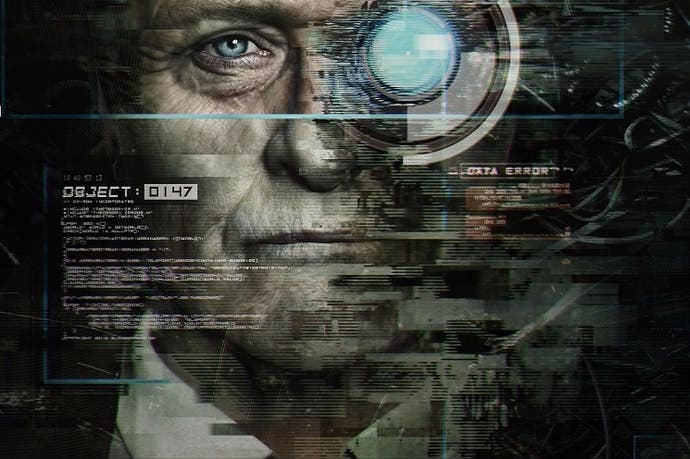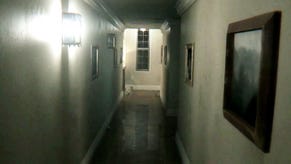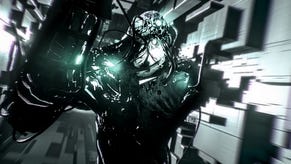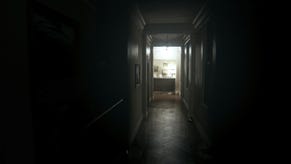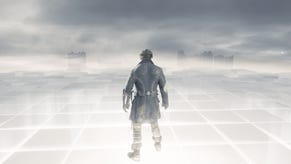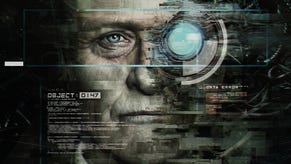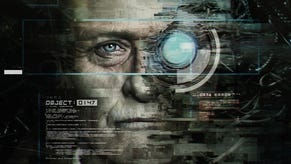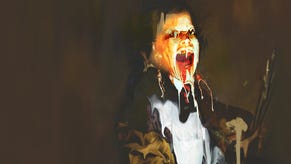Observer review
Hauer of reckoning.
Bloober Team's Layers of Fear gave you a 19th century mansion in a state of continual, terrible reassembly, its furnishings switching places behind your back, its rooms expanding and contracting like the chambers of a heart. Observer gives you an entire apartment block, lifted from contemporary Krakow and teleported into a cyberpunk dystopia unabashedly pilfered from Blade Runner. It, too, delights in how the familiar might be rendered horrible, with certain objects and layouts reappearing in ever more nightmarish guises as you progress through its seven hour plot, but it also casts its net a little wider, to encompass a world in which the digital has displaced and eroded the physical - a world that isn't so much the grim future as present-day neglect, alienation and torment fed through an amplifier. In Observer, surfaces don't merely shapeshift when out of view but fester visibly with computational ephemera, lines of green code crawling across doorframes and wallpaper, asserting the geometry of rooms, corridors and tunnels even where the brickwork beneath has rotted away.
We've seen these kinds of ambient AR flourishes many times before, of course - Deus Ex: Mankind Divided and Tom Clancy's The Division are two parallels that occur off the top of my head - and you could argue that Observer's portrayal is laboured, stagey: there's an overabundance of cathode-ray TVs displaying fizzy close-ups of twitching mouths and eyes, for example. But few games set in the overlap between digital and architectural space entwine their motifs as brilliantly, and if the surgery is messy, that's to the purpose. Observer is a game that makes what is essentially a building-wide wifi network feel profoundly unclean, like something you want to scrub off, hack out even as you make use of various invasive technologies to further the story.
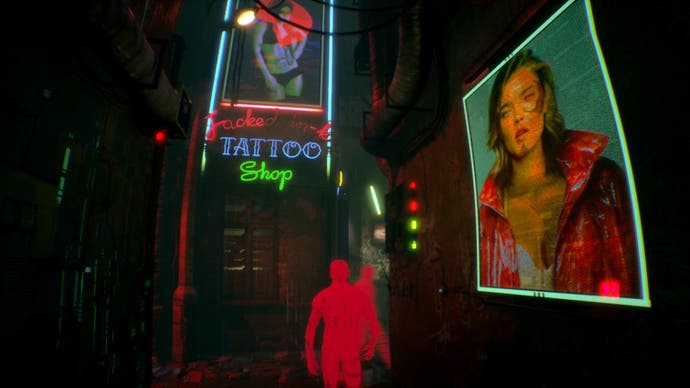
As Bertie discovered earlier this year, one of the great surprises with Observer is that it's secretly a detective game. As Daniel Lazarski, an ageing snoop with a headful of forensic gadgetry, you travel to an apartment block to investigate a mysterious message from your estranged son. Shortly after you arrive, certain events trigger a lockdown, leaving Daniel to explore the cramped, winding structure, knocking on doors and picking over grisly crime scenes using two vision modes - one for analysis of mechanisms, the other for organic evidence such as blood spatter.
The building's initial highlight is its courtyard, a mass of puddled concrete swarming with pigeons, where you'll peer up at stunning cyberpunk megastructures swathed in holographic mist and linked by intestinal ropes of circuitry. As with much else, that gorgeous vista alters subtly and not-so-subtly in the course of the game; it harbours details that become relevant down the line. The location's greatest asset, however, proves to be its mostly unseen civilian population - a collection of lost souls you'll chat to through intercoms, experimenting with aggressive or diplomatic dialogue options as you try to work out what your wayward son is up to.
The people in question are a diverse, sympathetic and, give or take the odd dose of schlock or sentimentality, engagingly written bunch, each naturally doubling as a window on the universe beyond the building's crumbling facades. You'll speak to widows about loved ones quarantined by the state during an outbreak of cyborg brain disease, and ask ogreish fathers about their misbehaving kids. You'll talk (well, providing you're feeling kind) a reclusive young man through a fit of claustrophobia, and press the neighbourhood pervert for his thoughts on a couple across the corridor. Many of these interactions are optional, and some pay into a small clutch of well-wrought side cases with several possible outcomes. The over-arching plot isn't boundary-breaking for a cyberpunk tale, but it's competently woven and, in any case, plays second fiddle to the grubby nuances of the dialogue and set-dressing.
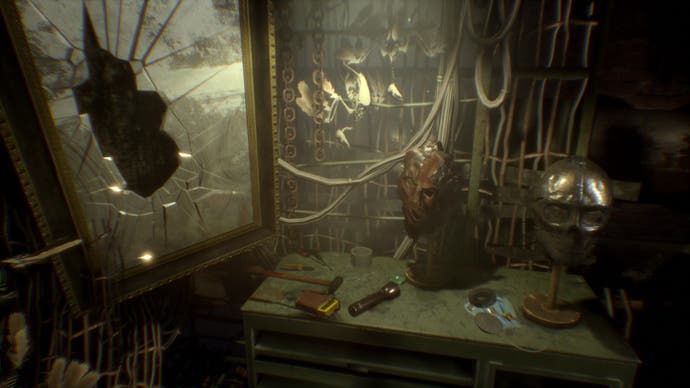
While gossiping with the residents you'll also get to know Lazarksi himself, played by Rutger Hauer in one of the few examples of a celebrity tie-in that actually adds to the experience. Part of the thrill, of course, is essentially casting Roy from Blade Runner in the role of his nemesis, Deckard, but Hauer also lends a distinctive texture to the part - by turns detached, baleful, kindly and bemused. Among the script's virtues is its terseness: Lazarksi talks to himself while piecing together evidence, but this is always atmospheric rather than intrusive, the pinched asides of a career investigator who spends a lot of time on his lonesome, poking through scenes of squalor.
Where conversation and old-fashioned detective work aren't enough, you'll fall back on Lazarski's signature trick as one of the eponymous Observers - the ability to jack somebody's brain and relive their memories as a series of vivid hallucinations. It is in these hallucinations that the game skews most towards straight-up corridor horror and alas, loses its way a little. There are some great unifying themes, admittedly. One stand-out is a memory inspired by werewolf movies where you must choose repeatedly between the luminous silhouette of a deer and a garish red door. Another is a room that harkens back to the sumptuous, gentrified decor of Layers of Fear, where you must twiddle a radio dial to set a ghastly animation in motion.
The scares themselves, however, are largely hackneyed - think distant screaming and grating sounds, faces that warp obscenely as you approach, being teleported without warning and entities that judder in place before flying into fast-forward - a nod to the psychedelic imagery of Jacob's Ladder. The visual metaphors may be eye-catching but there's much less of the precision and restraint you find in Frictional's Amnesia games (the latter's Soma, a game I can't seem to stop recommending in reviews of other games, is also a more convincing meditation on many of Observer's core philosophical quandaries). Least enticing of all are the episodes where you must avoid a roving foe, ducking behind objects and scurrying for the exit while your adversary is at the other end of its patrol path - fortunately, the checkpointing is generous.
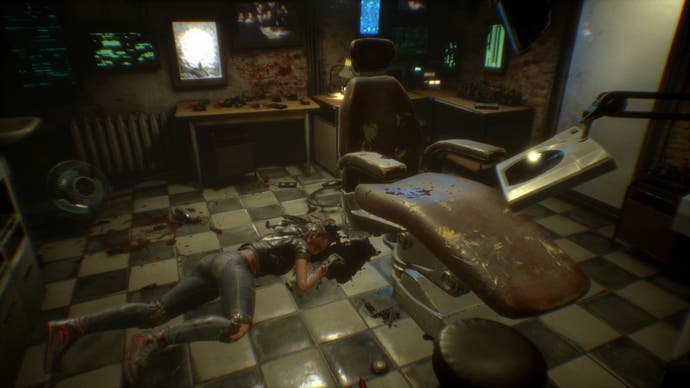
It's just as well, then, that you've always got that apartment block to return to, with its bodiless voices and creeping decrepitude, its cavernous, neon-slicked skyline and spectral ebb and flow of projections. As a vehicle for terror, Observer isn't quite up there with the best the genre has to offer, but as an excavation of an environment that is writhing with the internet's effluence, a space that manages to feel at once suffocating and vast, ornate and putrid, it has few equals.
